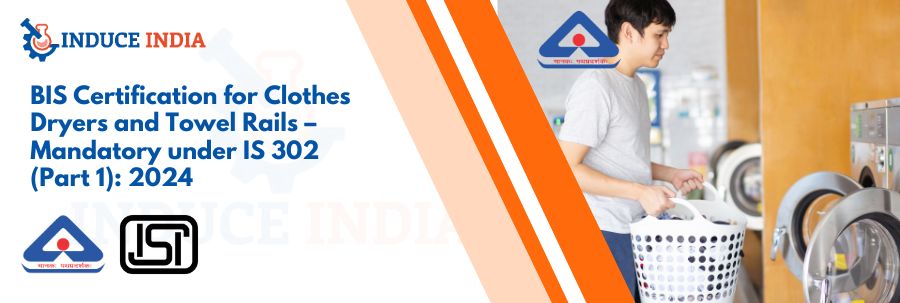Our everyday living in the contemporary world is peripheral to the electrical appliances. The clothes dryers and towel rails are handy items in their respective area of use to deliver comfort, sanitation, and sanitation in the homes and business areas. The question of the safety factor has gained great relevance because of the growing number of individuals using the appliances. The danger of an electrical defect that stops a minor appliance, of a clothes dryer or towel rail, and produces fires or shocks is present, among others. This is why the Bureau of Indian Standards (BIS) has proposed certification in the new standard as IS 302 (Part 1): 2024, as mandatory. This certification is done to ensure all the appliances sold in India are of high safety, and this quality control that does not only protects its customers but also the businessmen.
We will discuss everything you need to know about BIS certification as applied to clothes dryers and towel rails, its significance, the procedure, compliance terms and its changes on sub-manufacturers and users in this blog. You shall discover, at its conclusion, why it is not just a regulatory means, but is also a testimony of good faith and trustworthiness.
What is BIS Certification?
BIS certification refers to a certificate of quality and safety conferred upon products by a statutory body known as the Bureau of Indian Standards, which lays down the standards of products being sold in India. In electricity appliance applications, e.g., clothes dryers, towel rails, etc., the BIS ensures that the concerned equipment complies with the Indian-sanctioned standard on safety of domestic and similar electrical equipment, i.e. IS 302 (Part 1): 2024.
This certification involves testing, which is white collar electrical safety testing, thermal testing, and mechanical dependability testing, as well as overall testing as far as continuing is concerned. Any product passing these tests can wear the BIS certification mark, signifying the buyers that these products have been made according to the utmost safety procedures achievable. In India, the sale or distribution of such appliances is criminal unless they are certified, and the individuals who manufacture them may also pay a fine.
Heat-generating appliances, including heating towel rails and dryers, are highly relevant to BIS certification. Possible action: The heating coils, wires, and insulation in these appliances can be faulty and dangerous. The BIS mark demonstrates how these can be proven problem-minimising.
BIS Certification: Importance of Clothes Dryers and Towel Rails
Clothes and towel rails definitely do not seem to be the most complicated ones, yet they have heating components, electrical cords, and are used every day. That may be very dangerous when not constructed adequately. The BIS certification stipulates that the product is also tested concerning overheating, electricity safety and resistance to fire.
It is a certification that gives consumers peace of mind. It will show that the appliance would be secure in their homes. BIS certification brings confidence to the minds of businesses and retailers. Certified products need to be safe for customers in those places where much of the population also uses many of the electric appliances at the given time.
The law is also advantageous with respect to BIS certification. Unless a product is certified, any form of authority may seize it, and the funds go to waste, and this situation is accompanied by a tarnished reputation of the company. Business organisations follow BIS regulations, a factor that correlates to their interest towards consumer health.
Key Requirements Under IS 302 (Part 1): 2024
The major safety regulations of electrical appliances refer to the standard IS 302 (Part 1): 2024 will be involved in most cases. When it comes to clothes dryers and towel rails, the manufacturer must follow the following rules:
- Electrical Safety: One should not be able to be shocked by the machine. They test wires, insulations, safety and grounding circuits.
- Thermal Safety: components need not be grilled unless necessary, and the device can be programmed with a form of shutdown system when it becomes too heated.
- Mechanical Safety: The components, such as fasteners and moving components, will not be worn out.
- Fire Resistance: The material should not be easily ignited by the occurrence of any malpractice.
- Life-span and dependability: The appliances will need to work efficiently for a long time, and that does not conflict with security.
These standards guarantee the security of domestic and business electrical appliances. BIS checks and certifies them and issues them a certificate.
BIS Certification Process
This process of becoming a BIS-certified consultant takes time, and it is completed in phases:
- Application: A producer applies to BIS with the product application, submitting product details along with their technical specifications and manufacturing information.
- Product Testing: The appliance is put in a certified laboratory where it is tested against ISO 302 (Part 1): 2024.
- Technical Inspection: BIS also visits the factory to ensure that the production process remains the same in terms of quality.
- BIS Certification Grant: If all tests are successful, BIS give out the license which allows the use of the BIS mark.
- Checks and Retests: BIS makes frequent visits to service the appliance.
It can take a few weeks or maybe a few months, and it depends on the difficulty of the product and the preparedness of the annexor. Planning and good record-keeping can minimise the delays.
Fair Trade Approaches for manufacturers
Makers also have no encounter with certification in the BIS law. It renders an enterprise a competitive advantage, too. The certificate shortens the selling of products in both local and international markets. They can be positioned as being safe, reliable and of high quality, and this surpasses competitors who are not licensed.
Laws are also minimised in certification. Should there occur an accident with an appliance, usually, the BIS-certified makers would be better placed to prove that s/he operated within the regulations. Additionally, certification will allow makers to work with the well-known retailers and online platforms that will mandate BIS-marked products.
Benefits of BIS-Certified Appliances to Consumers
The advantages to consumers are clear-cut. BIS-certified dried clothes dryers and towel rails reduce the risk of electric shocks, fire, and the components becoming broken. They take a long time before they are built, and thus you end up paying fewer expenses in repairing or purchasing replacements.
Further, the BIS label enables one to distinguish between genuine and quality products and lesser ones in a commercialised industry. The BIS logo is a good indicator of a safe product in a place like India, where most of the imports and local appliances may not be safe as per the safety regulations set for them.
Issues and Obstacles
Although BIS certification has numerous advantages, there is a risk that manufacturers may run into difficulties when complying with the rules. Such areas may include testing, factory checks, and certification, which might be expensive, particularly to small businesses. Ensuring that all products remain in compliance with stringent regulations requires financial resources in ensuring quality checks, employee training, and equipment.
Nevertheless, these issues are compensated for by the benefits over the long run. Failure to comply may result in the removal of products, fines, and bans, and this is much more expensive than paying certification expenses in advance.
BIS Certification Renewal and Surveillance
The certification of BIS is an ongoing process and not a single exam. To stay in touch with the rules, manufacturers need to renew and get monitored. BIS conducts frequent inspections of factories and selects some of their goods randomly to check them.
These checks ensure that each batch remains safe and is of a quality that complies with rules. Constant observation is particularly significant to such products as clothes dryers and towel rails that can become hot and are handled over an extended period.
How Induce India Can Help
BIS certification may be a tricky phase, especially for manufacturers that are new to the Indian market. At Induce India, we will assist in each process, which includes knowledge on the IS 302 (Part 1): 2024 requirements, continuously receiving applications, preparation to undergo an inspection, and compliance throughout manufacturing.
One of our provisions is our staff of highly qualified professionals who make sure your product meets the technical and regulatory requirements, thus saving you time and the expense of addressing such errors. The certification process is smooth and hassle-free, as we also offer continuous support on surveillance, product testing, and documentation.
Conclusion
The BIS certification of clothes and towel rail dryers according to IS 302 (Part 1): 2024, is not merely a legal statement, but it is a monumental measure in maintaining not just the consumer safety but the product or business credibility. Certified products prevent electrical hazards in the household and increase consumer confidence, and provide a competitive advantage to manufacturers.
Even though it might be considered a difficult task, with the proper guidance and preparation, the BIS certification can be a systematic and organised process. Companies such as Induce India may offer the necessary skills and assistance in moving through the process smoothly and at an affordable rate to ensure that your appliances are of all standards in terms of safety and quality.
Today, when safety, reliability, and quality are paramount, BIS certification is the standard that distinguishes reliable products from others. To both the manufacturer, retailer and even consumers, it is a sign of trust and responsibility for peace of mind.



